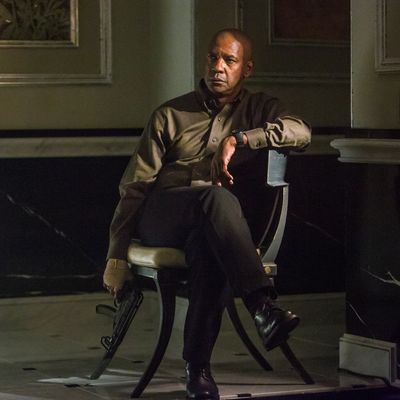
There’s a special kind of hell for artists who array vigilante revenge-porn in saintly garb, and Denzel Washington and director Antoine Fuqua should go to the front of that damnable line after The Equalizer. Washington plays Robert McCall (as in, “Who ya’ gonna McCall?”), a gentle, paternalistic, self-effacing low-level manager at a Home Depot–like hardware store. He lives in an unadorned apartment and eats by his lonesome every night at the same diner, where he reads the latest in a line of good-mental-hygiene classics of the Western canon. (The aging widower is working on Hemingway’s The Old Man and the Sea.) He makes small talk with the regulars, among them Chloë Grace Moretz as Teri, a Russian-born hooker with dreams of being a singer-songwriter. When Teri starts showing up with shiners — and worse — McCall is quietly stricken. He knows the world is full of very bad men, but what can a peaceable sweetie do against crooked cops and psychopathic Russian mobsters?
You’d be surprised. Or not, if you’ve seen the previews — and about a thousand other films with the same arc.
Few are as classy as this one, though. The Equalizer — which takes its premise from the ‘80s TV show starring that hoary Brit Edward Woodward — has an unusually polished script and first-rate production values, and Fuqua holds off on the carnage for at least half an hour to distinguish it from boneheaded B and C movies playing all night on cable. It opens with a quote from no less than Mark Twain: “The most important days in your life are the day you were born and the day you find out why.” McCall, it seems, was born to even the odds between the strong and the weak, the haves and have-nots. It would be great if Fuqua had turned him loose on Wall Street instead of the usual scummy gangsters — let him crusade for equal pay for equal work or higher carbon taxes to offset damage to public health. Maybe he can do that in the sequel. In this one, he’s too busy jamming corkscrews into bad guys’ throats and giving them a twist.
The only real shock in this utterly routine movie — when was the last time you saw a lone hero stride toward the climactic killing ground in slow motion? Yesterday? An hour ago? — is the contrast between the hero’s recessive demeanor and the insane quantity of gore that he generates. Movies are full of righteous executioners (among them Washington himself in Man on Fire), but none has ever done so much slaughtering with a halo so firmly affixed. In his physical resourcefulness and readiness to kill (he doesn’t take prisoners), McCall resembles Lee Child’s do-gooder executioner Jack Reacher — recently misembodied by the diminutive Tom Cruise. But Reacher at least acts like a cocky jerk instead of Gandhi with a Glock. McCall has a backstory — he apparently did some things he’s not proud of — but here he’s the Father of Us All.
Who could possibly be worthy of being killed by him? McCall’s principal opponent is a Russian fixer called Teddy played by Marton Csokas. (“He’s a sociopath with a business card. He won’t stop until he kills you and anyone you care about!”) As a boy, Teddy murdered his kindly adoptive parents. As a grown-up, he smashes skulls and (in an appallingly protracted scene) lovingly strangles a prostitute who tried to help Teri. Much of his body is covered with a single demonic tattoo, and in one scene, he throws back his naked torso and appears to be calling out to Old Scratch himself. The only really fun thing in The Equalizer is the way he puzzles and puzzles and puzzles over McCall, who’s busy shooting and stabbing and breaking the necks of Teddy’s allies. This fellow makes no sense, he says: “Everything about him is wrong.” Teddy has the wondrous innocence of a man who has never seen a vigilante-revenge movie.


